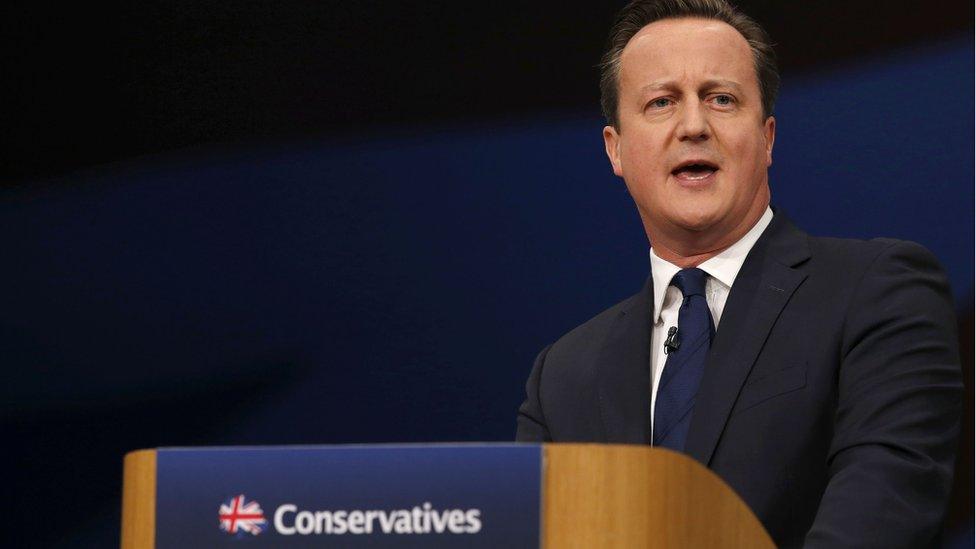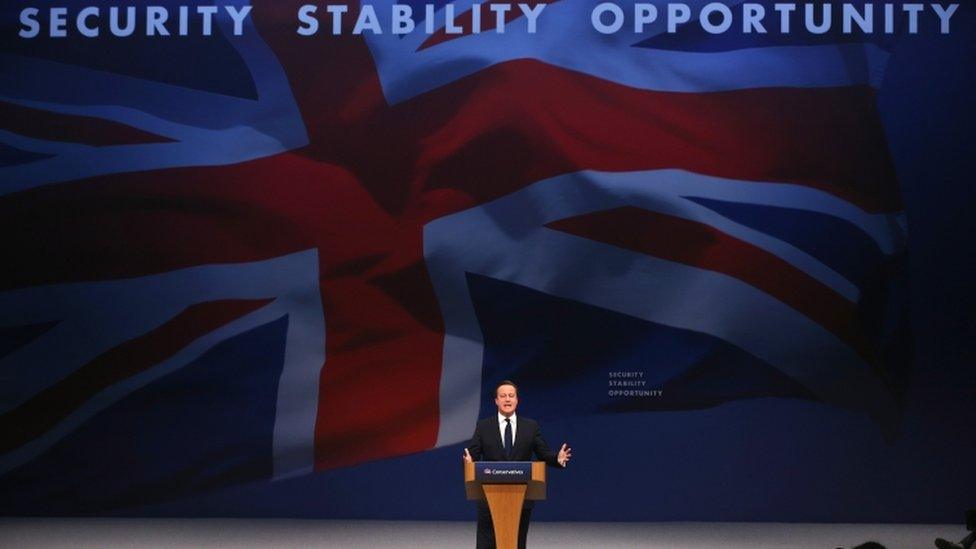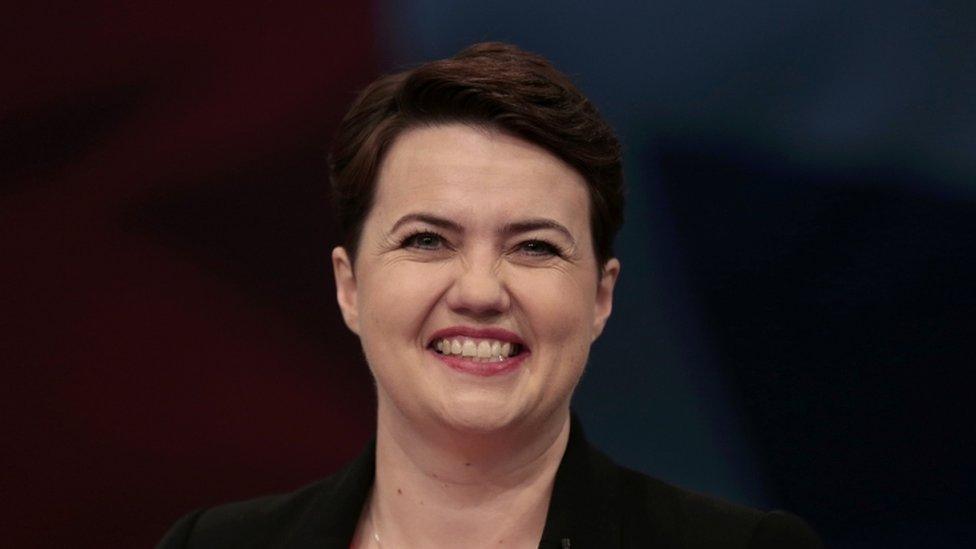Arguments about Scotland were for another day
- Published

It is not all that long since David Cameron triumphed at an election; somewhat unexpectedly, as he reminded his party's conference in Manchester. But plainly his thoughts are already turning to the next electoral contest.
He specified the timetable. He set out the core issues. He delineated the dividing lines between his party and their rivals which would, he argued, inform that contest to come.
Was he talking about the Scottish Parliament elections, due next May? Who said No? Give that person a goldfish or a furry toy, according to choice.
Rather, the Prime Minister was defining once more his own political longevity: this is his final term in office. And referring to the contenders in the hall who might seek to replace him.
It was all oblique, of course. The name checks were for their present role - not an "all hail" for those who would be PM hereafter. But still the audience knew what he meant and duly responded.
The Iron Chancellor (for the avoidance of doubt, that is George Osborne) drew warm applause when his name was mentioned. But Boris got a standing ovation, no doubt to Gideon's chagrin.
To be clear, the Prime Minister also prompted an enthusiastic response when he confirmed his passionate backing for the Union.
He said he loved Britain - England, Scotland, Wales and Northern Ireland. And he added: "We are one nation and I will defend our union with everything I've got."

David Cameron outlined his commitment to the Union in his speech in Manchester.
But he did not expand upon that particular theme. There was, for example, no mention of the Scotland Bill, nor of English Votes for English Laws, nor of the forthcoming Holyrood elections, nor of the SNP.
This was in contrast to other issues - such as defence or extremism or social reform or the economy - where a generic statement was followed by detailed exegesis.
Perhaps he felt that detailed arguments about Scotland were for another day, another conference. Perhaps it was post referendum ennui - although I doubt that, given the salience of the topic in this particular Prime Minister's mind.
Perhaps it was a feeling - recently voiced by the Scottish Secretary David Mundell - that the proposed new reforms for Holyrood have been scrutinised in detail, are a done deal apart from a few amendments to come and should prove to be an end to the constitutional debate. Move on now, nothing to see here.
(And the response to that from political rivals? Correct - but, hey, do you think I have an endless supply of goldfish or indeed furry toys?)
Perhaps it was because the speech was designed to make the party feel good about itself. Mr Cameron listed Westminster gains from Cornwall to the Midlands and the north of England. Scotland rather sours that pitch.
Most probably, it was felt that the speech should deal solely and in depth with an attempt to set out a philosophical agenda for this, David Cameron's final term. That agenda was social reform, tackling the deep-seated issues such as addiction and family breakdown which, the PM argued, were at the root of poverty and alienation.

Brian is all out of cuddly toys
Incidentally, if that agenda sounds familiar, that is because it comprised David Cameron's stated ambition before the twin diversions of coalition and austerity took hold.
In any event, the speech was designed to depict the Conservatives as patriotic but modern social reformers. By contrast, Labour's new leader - whom Mr Cameron did not trouble to name - was depicted as a "Britain-hating" ideologue.
Intriguingly, there was another big-league issue which only merited a generic mention in Mr Cameron's speech. That was the European Union.
No-one could deny that is a huge and permanent presence in the PM's in tray. It potentially divides his party. He has promised a referendum. He is in the middle of negotiations with EU partners in an effort to repatriate powers to the UK.
Yet, again, there was little more than a broad-brush statement. He wanted Britain to remain in the EU for trading purposes - but was opposed to "ever closer union". He promised - without specifying a single detail - to "put that right".
Once again, it would seem this was a battle deferred. In a Tory feel-good speech, Mr Cameron did not risk any lengthy reference to the topic most calculated to deflate such sentiments.
Further, he said that he had "no romantic attachment to the European Union and its institutions". That sounded to this observer vaguely like the old declaration that Britain had no selfish, strategic or economic interest in Northern Ireland.
That statement, of course, was designed to counter thoughts of imperialism and to stress that the people of Northern Ireland had complete, self-determined control over their constitutional future.
This is comparable - if, to stress, different - in that the PM is saying to Euro-sceptics and the people of Britain that he will not seek to convince them against their will or evident interests to remain in the EU. He is only interested in "Britain's prosperity and influence".
By contrast, this Prime Minister does indeed have a romantic, passionate attachment to another Union, that of the United Kingdom - while arguing simultaneously that it has a pragmatic advantage too.

Ruth Davidson said Labour and the Lib Dems were "embarrassed by their support of the Union"
Ruth Davidson, the Scottish Conservative leader, has made that point explicitly, contrasting the EU and the UK. She also had a series of interesting points to make in her address to the Manchester conference.
Ms Davidson, you will not be surprised to hear, had rather a lot to say about Scotland: including the Scotland Bill ("a practical plan for the Union") and the forthcoming elections.
With an eye to that May contest, she sought to posit her Scottish Tories as the true defenders of the Union - and to suggest that they might therefore be the recipients of support from those who dislike independence and consequently fear the power of the SNP.
In practice, she said, that meant voting Tory in the list section of the ballot. This strategy is understandable but is also, of course, predicated upon conceding the strength of the Nationalists. To be clear, Ms Davidson has been admirably frank on that point in the past, forecasting a "tsunami" of SNP votes at the UK elections in May. (You know what? She was right. But I am clean out of fish and toys.)
Ms Davidson's appeal was based upon two further factors. That the SNP refuses to rule out another referendum: which is right although Nicola Sturgeon is notably cautious. And, secondly, that "Labour and the LibDems now seem embarrassed by their support of our Union".
In practice, she offered little in the way of evidence for that second claim - although no doubt it will form part of her argument in the run-up to May. As with David Cameron, one speech is never enough to say all you have to say.